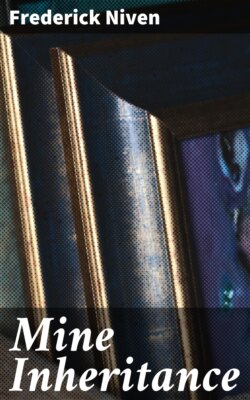Читать книгу Mine Inheritance - Frederick Niven - Страница 26
На сайте Литреса книга снята с продажи.
I
ОглавлениеTable of Contents
But I have no intention to give you an ennui by recounting in detail all that gave ennui to Captain Macdonell and us his officers during the next many months. Let me but tell briefly, as it were an inventory of mischance, that in the ship bringing immigrants in 1813 typhoid broke out and they were landed well up the coast from York Factory where they spent a dreadful winter. They had a surgeon aboard but the Governor sent our own, from the Settlement, to aid them. The crops planted at Red River in that year failed. Back to Pembina almost all had to go again. Those wintering, from “the fever ship,” in huts at Hudson Bay would be coming on to join us when the rivers opened.
In desperation one day of January, in the year 1814, the Governor sat down in our quarters at Pembina. I knew by his tensity of manner he was near distraction. He took up a pen and commenced to write. There was no sound but the scratching of his quill and the hum of the Franklin stove. He was so engrossed that I had a feeling I must not stir. After a long while he turned in his chair and addressed me.
“Baxter,” said he, “do you take a copy of this,” and he handed to me the wet sheets.
At my table as I wrote my eyes widened in surprise, for this was my fair copy:
WHEREAS the Right Honourable Thomas Earl of Selkirk is anxious to provide for the families at present forming settlements on his lands at Red River with those on the way to it, passing the winter at York Factory and Churchill Forts, in Hudson’s Bay, as also those who are expected to arrive next autumn, renders it a necessity and indispensable part of my duty to provide for their support. In the yet uncultivated state of the country, the ordinary resources derived from the buffalo and other wild animals hunted within the territory, are not deemed more than adequate for the requisite supply.
WHEREAS it is hereby ordered, that no persons trading furs or provisions within the territory for the Honourable Hudson’s Bay Company or the North-West Company, or any individual, shall take any provisions, either of flesh, fish, grain, or vegetable, procured or raised within the said territory, by water or land carriage, for one twelvemonth from the date hereof; save and except what may be judged necessary for the trading parties at this present time within the territory, to carry them to their respective destinations; and who may, on due application to me, obtain a licence for the same.
The provisions procured and raised as above shall be taken for the use of the colony; and that no loss may accrue to the parties concerned they will be paid by British bills at the customary rates. And be it hereby further made known, that whosoever shall be detected in attempting to convey out, or shall aid or assist in carrying out, or attempting to carry out, any provisions prohibited as above, either by water or land, shall be taken into custody, and prosecuted as the laws in such cases direct, and the provisions so taken, as well as any goods and chattels, of what nature soever, which may be taken along with them, and also the craft, carriages, and cattle, instrumental in conveying away the same to any part but to the settlement on Red River, shall be forfeited.
Given under my hand at Fort Daer (Pembina)
the 8th day of January, 1814.
There was a space left obviously for Captain Macdonell’s signature for at the end of the line was scribbled the one word Governor, then followed “by order of the Governor”; and in the line below was another space for Mr. Spencer’s signature, for at the end of it was the word Secretary. Mr. Spencer, as on the previous winter, was in charge at “the forks.”
As I copied I felt a sense of dismay and even for a moment hoped there might be delay in delivery of this missive to those whom it concerned. It would cause trouble, perhaps serious trouble. And yet, what was the Governor to do? Court Nez, I recalled, had warned me that the North-Westers at Qu’Appelle regarded the settlers as interlopers and that they would probably influence the half-breeds at Pembina to the same view. Well, there was no doubt they were less friendly on this second year of having the colonists wintering beside them. Even the year before I thought Miles Macdonell had not been astonished when I repeated to him Court Nez’s warning. But actually, I thought, it was the North-Westers who were the interlopers, Lord Selkirk who was the owner by his purchase from the Hudson’s Bay Company who had the land by ancient charter.
I remembered the day we reached the forks when Captain Macdonell conferred with Mr. Heney, remembered his voice as, after that conference, once or twice he muttered, “No pemican, no pemican.” The memory was so vivid that as I finished my fair copy it seemed to me he had actually spoken the words again. I turned my head. Perhaps he had said them, perhaps not. He was sitting back in his chair, his fingers beating out a quiet tattoo on the cover of a book that lay upon his table.
“It would be all to the good to have half a dozen copies of that,” said he.
